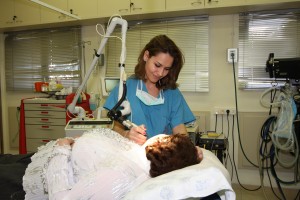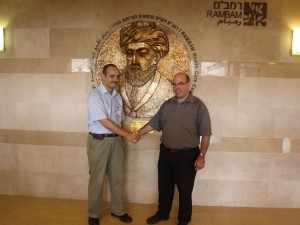Yesterday I wrote in (mostly) praise of Peter Hitchen’s recent MailOnline article about his visit to Gaza and the West Bank.
I covered his Gaza experiences, but his West Bank one is equally as enlightening.
Hitchens begins describing Arab hospitality but soon we find:
once again I saw the outline of a society, slowly forming amid the wreckage, in which a decent person might live, work, raise children and attempt to live a good life. But I also saw and heard distressing things
‘Wreckage’? Not sure what he means here. The last war here was 37 years ago. Many Arab towns in the West Bank look like anywhere else in the Middle East. Presumably this is a psychological wreckage in terms of almost 40 years of direct conflict with Israel.
At least we see civil society beginning to form, and about time too.
Hitchens is quick to see the plight of Christians under Palestinian Authority rule:
I feel all of us should be aware of … the plight of Christian Arabs under the rule of the Palestinian Authority. More than once I heard them say: ‘Life was better for us under Israeli rule.’
Ah! Interesting.
One young man, lamenting the refusal of the Muslim-dominated courts to help him in a property dispute with squatters, burst out: ‘We are so alone! All of us Christians feel so lonely in this country.’ Substitute ‘lonely’ with ‘hounded’ and persecuted’.
It appears it isn’t just Jews some Muslims are uncomfortable with. Whilst denying any Jewish connection to the Land of Israel, they now want to end 2,000 years of continuous Christian presence in the West Bank it appears. Will it be that a future Palestine is not just judenrein but christenrein as well.
This conversation took place about a mile from the Church of the Nativity in Bethlehem, where tourists are given the impression that the Christian religion is respected. Not really.
I was told, in whispers, of the unprintable desecration of this shrine by Palestinian gunmen when they seized the church in 2002 – ‘world opinion’ was exclusively directed against Israel. I will not name the people who told me these things.
I have also decided not to name another leading Christian Arab who told me of how his efforts to maintain Christian culture in the West Bank had met with official thuggery and intimidation.
There is no unsubstantial Christian presence in Bethlehem, as you might imagine. Hitchens tells us that it’s about 30,000 in the area but between 2001 and 2004 2,000 emigrated and if we assume that this migration will continue there may be no Christians at all in 10 to 15 years.
Arabs can oppress each other, without any help from outside. Because the Palestinian cause is a favourite among Western Leftists, they prefer not to notice that it is largely an aggressive Islamic cause.
Spot on, my man. This guy isn’t afraid to tell the truth.
Let’s digress here and look at the evidence for Christian persecution over many years. Let’s start with the Methodists current policy of a boycott of Israeli goods manufactured in the West Bank and their reason for it.
On their Conference website the most salient point for me is this:
The decision is a response to a call from a group of Palestinian Christians, a growing number of Jewish organisations, both inside Israel and worldwide, and the World Council of Churches. A majority of governments recognise the Israeli occupation of Palestinian territories as illegitimate under international law.
I’m not going to get into the argument that the settlements are or are not illegal, what strikes me is ‘a call from a group of Palestinian Christians’. The fact that there are Israeli groups which favour boycotts is none of the Methodists’ business, but the Christians are.
Yet the Methodists are fixated on what Jews are purported to be doing to Christians but make no equivalent criticism or boycott of many egregious Muslim activities where Christians are being murdered or expelled or persecuted.
CiFwatch recently had a cross post from the Point of No Return website about the ‘inferior status of Christians under Islam’, in other words, dhimmitude.
The atrocity at Our Lady of Salvation in Baghdad in which 52 Christians were murdered has set off a flurry of articles about Christians under threat of extinction in the Middle East. Al-Qaeda has declared Arab Christians a legitimate target. Even Robert Fisk of The Independent is sounding the alarm about a flight of Christians of Biblical proportions – and that was before the massacre.
First the Saturday people – now the Sunday people. Jews have been virtually wiped out in Muslim lands. Now it’s the turn of the ancient Christian communities. Forty percent of the Assyrian Christian population of Iraq has fled since the fall of Saddam.
And much of this under the noses of the American coalition forces, presumably.
Also, in Syria:
since the late 1960s private Christian schools have been suppressed, …. the Armenian Christians of Syria are leaving at a particularly high rate: the government has banned their associations, publications, the teaching of their language and their political party.
Hmm. Seems like the Christian Arabs of the West Bank are not alone.
What about Jordan:
the monarch [sic] sees itself as the protector of the six percent of Jordan’s population who are Christians; they are given limited political rights. However, there is plenty of evidence that displaced Iraqi refugees view Jordan as a way-station to a third country of asylum – namely,the US. The refugees – and by no means all are Christian – complain bitterly that as non-residents they are not permitted to work or are paid exploitative wages. Only those with $100,000 to spare can obtain Jordanian residency rights.
Hmm. Seems the Christians in Jordan are worse off than those in the West Bank too.
Surely in Egypt, I want some good news:
It was the ‘secular’ regime under Gamal Abdul Nasser which did most to marginalise the Copts, now barely 10 percent of Egypt’s population. They are not allowed to repair their churches without government permission, let alone build new ones. Ever since the 1950s, the Copts have been persecuted, murdered, their women kidnapped and forcibly converted. Copts have been leaving Egypt for decades.
Decades? Centuries, isn’t it?
New York, NY, November 16, 2010 … The Anti-Defamation League (ADL) today denounced the torching of at least 10 houses belonging to Coptic Christians in southern Egypt and called on Egyptian government officials to vigorously prosecute the perpetrators and increase protection for Copts. (http://www.adl.org/PresRele/IslME_62/5909_62.htm)
Hmm. So Egypt is also bad. So that’s Iraq, Syria, Jordan and Egypt. Lebanon, then, with its institutionalised power sharing between Muslim and Christian can be the only haven for Christians in the Middle East? Surely?
I found an excellent website: Christian Persecution Info. The Methodists should have a read:
Lebanese security forces prepared to crackdown on Islamic insurgents Friday, June 25, after threatening leaflets were found calling on Christians to leave a key port city, and a bomb blast that killed at least one person in a predominantly Christian town.
Officials said they already detained this week two suspects accused of distributing the threatening publications in the southern port city of Sidon. Those arrested where [sic] not immediately identified.
The leaflets included Islamic slogans and warned Christians in the area to “spare their lives by evacuating the area within one week” or “bear the consequences,” Lebanese media reported.
Underscoring the seriousness of the threats was a bomb blast last weekend that ripped through a car parts shop in eastern Lebanon, killing one person and injuring two others, an official said, speaking on condition of anonymity.
The explosion reportedly occurred shortly before midnight Saturday, June 19, in an industrial neighborhood of the predominantly Christian town of Zahle.
Now correct me if I’m wrong, but isn’t it the current Israeli Foreign Minister, Avigdor Lieberman, who is accused of wanting to drive out Arabs? Yet Israel seems to be the ONLY place in the area where Christians are free to worship without hindrance, are free from persecution.
You could accuse me of selective bias. OK, find me some negative stories about Christians being persecuted by the state in Israel.
I found a nice Italian site in English with the endearing headline ‘In Israel, Christians are Sprouting’. Conjures up an interesting picture, but we know what they mean.
Many of the members of indigenous communities, heirs of the ancient forms of Christianity that flourished there before the arrival of Islam, are fleeing.
The ones who remain live here and there in terror, for example in northern Iraq, in Mosul and the surrounding area, where in order to defend themselves they tend to make ghettos in the plain of Nineveh.
Ah, Iraq again.
And Israel?
The number of Christians within the borders of Israel has not been falling, but in absolute terms it has risen year after year: from 34,000 in 1949 to 150,000 in 2008, the last official figure.
One can speak only of a slight reduction in percentage terms – from 3 to 2 percent – because in the same span of time the number of Jewish citizens has grown from one million to 5.5 million, thanks to immigration from abroad, and the number of Muslims from 111,000 to 1.2 million.
Most of the Christians in Israel live in Galilee, while there are 15,000 of them in Jerusalem.
The exodus of Christians that has set off alarms therefore does not regard Israel, but rather the Holy Land, a geographically flexible term that extends to the Palestinian Territories and parts of the neighboring Arab countries, all the way to Turkey and Cyprus.
And for balance:
… there are the Palestinian Catholics who have been in Israel since its foundation, with the status of citizenship but in socially disadvantaged conditions.
Yes, maybe the Methodists would be better directing their efforts to helping the Arabs just like Jewish organisations:
LONDON – A new Jewish community initiative to promote understanding and equality for Israel’s Arab citizens is up and running with the announcement last week of its first coordinator.
The United Kingdom Task Force on Arab Citizens of Israel was set up last year by a broad coalition of Jewish organizations, to deepen UK Jewish engagement and understanding of issues facing Israeli Arabs and to leverage communal resources to provide effective solutions for furthering their rights.
Founding members of the initiative are the Board of Deputies of British Jews, United Jewish Israel Appeal, the Pears Foundation, the Zionist Federation of Great Britain and Ireland, the New Israel Fund and UK Friends of the Abraham Fund. The task force’s executive committee is made up of the chairmen or chief executives of those organizations.
Task force members have highlighted the obligation set out in Jewish tradition and Israel’s Declaration of Independence to social and political equality for all the country’s inhabitants – Jews and Arabs alike.
Until a few years ago, there were just a few hundred Hebrew-speaking Catholics in Israel. But they are growing steadily, and today number at least seven communities: in Jerusalem, Jaffa, Be’er Sheva, Haifa, Tiberias, Latrun, and Nazareth.
But let’s move back to Peter Hitchens territory and look again at the plight of Christian Arabs in the Palestinian Authority controlled Bethlehem and see what Daniel Pipes was reporting in 2007:
… a campaign of persecution against the Christians of the West Bank and Gaza has succeeded. “Even as the Christian population of Israel grows, that of the Palestinian Authority shrinks precipitously. Bethlehem and Nazareth, historic Christian towns for nearly two millennia, are now primarily Muslim.
…
Khaled Abu Toameh of the Jerusalem Post reports from Bethlehem, increased attacks by Muslims on Christian-owned property in recent months means that
some Christians are no longer afraid to talk about the ultra-sensitive issue. And they are talking openly about leaving the city. … According to the families, many Christians have long been afraid to complain in public about the campaign of “intimidation” for fear of retaliation by their Muslim neighbors and being branded “collaborators” with Israel. …
And in Hudson New York in May 2009, Khaled Abu Toameh again reported:
Christian families have long been complaining of intimidation and land theft by Muslims, especially those working for the Palestinian Authority.
Many Christians in Bethlehem and the nearby [Christian] towns of Bet Sahour and Bet Jalla have repeatedly complained that Muslims have been seizing their lands either by force or through forged documents.
In recent years, not only has the number of Christians continued to dwindle, but Bethlehem and its surroundings also became hotbeds for Hamas and Islamic Jihad supporters and members.
Moreover, several Christian women living in these areas have complained about verbal and sexual assaults by Muslim men.
Over the past few years, a number of Christian businessmen told me that they were forced to shut down their businesses because they could no longer afford to pay “protection” money to local Muslim gangs….
…..
On the eve of Pope Benedict XVI’s visit to the Holy Land, a Christian merchant told me jokingly: “The next time a pope comes to visit the Holy Land, he will have to bring his own priest with him pray in a church because most Christians would have left by then.”
Indeed, the number of Christians leaving Bethlehem and other towns and cities appears to be on the rise, according to representatives of the Christian community in Jerusalem.
Today, Christians in Bethlehem constitute less than 15% of the population. Five or six decades ago, the Christians living in the birthplace of Jesus made up more than 70% of the population.
Now there IS a cause for the Methodists who probably just care about this bit:
True, Israel’s security measures in the West Bank have made living conditions more difficult for all Palestinians, Christians and Muslims alike. But to say that these measures are the main and sole reason for the Christian exodus from the Holy Land is misleading.
If the security fence and the occupation were the main reason, the Palestinian territories should by have been empty of both Muslims and Christians. These measures, after all, do not distinguish between Christians and Muslims.
In fact, Christians began leaving the Holy Land long before Israel occupied the West Bank and Gaza Strip in 1967. But the number of those moving to the US and Canada has sharply increased ever since the Palestinian Authority took control over Bethlehem and other Palestinian villages and cities. When the second intifada erupted in September 2000, Christian leaders said they were “terrified” by the large number of Christians who were leaving the country.
Ironically, leaders of the Palestinian Christians are also to blame for the ongoing plight of their people because they refuse to see the reality as it is. And the reality is that many Christians feel insecure and intimidated because of what we Muslims are doing to them and not only because of the bad economy.
When they go on the record, these leaders always insist that Israel and the occupation are the only reason behind the plight of their constituents. They stubbornly refuse to admit that many Christians are being targeted by Muslims. By not talking openly about the problem, the Christian leaders are encouraging the perpetrators to continue their harassment and assaults against Christian families.
Gotcha! Gotcha, Methodists. You believe what you want to believe and blame the Jews, the Christ-killers and ignore the real persecution. For shame!
Let’s get back, once more, to Hitchens odd Odyssey across the West Bank where, Alice-like, he encounters some strange truths.
Hitch and the Wall (barrier, actually, for most of its length)
Think about this wall. I acknowledge that it is hateful and oppressive – dividing men from their land, and (in one case) cutting across the playground of a high school. But I have concluded that it is a civilised response to the suicide bombing that led to its being built.
Encountering Muslim anti-Semitism:
My host, a thoughtful family man who has spent years in Israeli prisons but is now sick of war, has been talking politics and history. His wife, though present, remains unseen.
Suddenly he begins to speak about the Jews. He utters thoughts that would not have been out of place in Hitler’s Germany. This is what he has been brought up to believe and what his children’s schools will pass on to them.
The heart sinks at this evidence of individual sense mixed up with evil and stupidity. It makes talk of a ‘New Middle East’ seem like twaddle. So, are we to despair? I am not so sure.
This is the demonisation that few neutrals and no anti-Zionists speak of, and if they do, they’ll tell you it is ‘understandable’.
Here Peter scrabbles to find a suitable end to his article, telling us about improving conditions, shops serving Arabs and Israelis and hoping the whole thing won’t end in a nuclear Holocaust.
Well done, Hitch. Not a perfect 10, but you made me think there is hope yet for the British Press.
Update: I noticed that Prof. Barry Rubin has written on this subject here.


